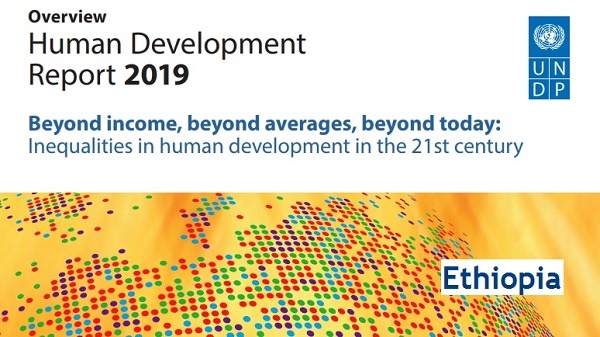
Although Ethiopia’s HDI value show a 65.8% increment between 2000 and 2018, it is still below the average of countries in the low human development category
(UNDP) – Despite unprecedented progress against poverty, hunger and disease, many societies are not working as they should, and the connecting thread, argues a new report from United Nations development Programme (UNDP), is inequality.
The report, which pioneers a more precise way to measure countries’ socioeconomic progress, observes that African countries have made significant strides in advancing human development, gaining ground on the key indicators of primary education and health. Between 1990 and 2018 life expectancy increased by more than 11 years. However, new inequalities are becoming more pronounced particularly around tertiary education, seismic effects of technology and the climate crisis making it harder for those already behind to catch up.
As the inequality in a country increases, the loss in human development also increases and in the case of Ethiopia, inequality is having a profound costto the country, with the data showing a loss of 28.4 percent as the country’s Human Development Index (HDI) falls to 0.337. The HDI measures long-term progress in three basic dimensions of human development; a long and healthy life, access to knowledge as well as a decent standard of living.
Ethiopia’s performance on Human Development Index (HDI)
Ethiopia’s HDI value for 2018 is 0.470 – which puts the country in the low human development category positioning it at 173 out of 189 countries and territories.
Although Ethiopia’s HDI value show a 65.8 percent increment between 2000 and 2018 (from 0.283 to 0.470), it is still below the average of countries in the low human development category, most of them in Sub-Saharan Africa. Life expectancy at birth increased by 19.1 percent between 1990 and 2018.
In terms of Gender Inequality Index (GII), Ethiopia is ranked 123 out of 162 countries with a value of 0.508, while only 37.3 percent of parliamentary seats are held by women, and only 11.5 percent of adult women have reached at least a secondary level of education compared to 22.0 percent of their male counterparts.
Thinking beyond income, the report puts emphasis on early childhood and lifelong investment including investing in young children’s learning, health and nutrition to tackle inequality. It recommends investments in policies that enhance productivity, fair taxation and improved public spending.
The report also highlights how ‘averages’ often hide what is really going on in society and the need for a much more detailed information to tackle inequality effectively and to address multiple dimensions of poverty.
Looking beyond today, the report asks how inequality may change in future, looking particularly at two seismic shifts that will shift life up to the 22nd century: the climate crisis and technological transformation.
As is typical of these reports, it now sparks fresh debate and discourse on what inequality looks like and to have a deeper understanding of how inequality will change given the economic, social and environmental transformations that are unfolding globally, but beyond that, the policy options needed to effectively tackle it.
You can read the full HDI 2019 report (English) here.
Source: UNDP Ethiopia
